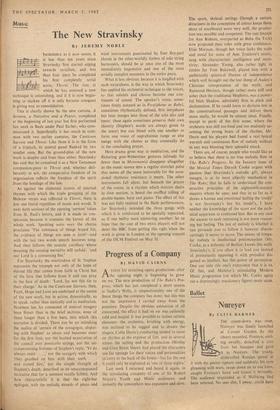Progress of a Company
By DAVID CAIRNS
ATnsTE for revisiting opera productions after the opening night is beginning to grow on me, The new production of The Rake's Pro- gress, which has just completed a short season at Sadler's Wells, is unquestionably one of the finest things the company has done; but this was not the impression I carried away from the premiere. Despite the obvious animation of all concerned, the effect it had on me was curiously cold and insipid. It was possible to isolate certain elements—the orchestra, bristling. with energy, was inclined to be ragged and to drown the singers, Colin Davis's conducting tended to insist on rhythm at the expense of line, and in several scenes the setting and the production (Motley and Glen Byam Shaw), had placed the characters too far upstage for their voices and personalities to carry to the back of the house—but for the rest it could only be explained as 'one of those nights.'
Last week I returned and heard it again, in the stimulating company of one of Sir Robert Mayer's Youth and Music audiences; and instantly the atmosphere was expansive and alive. The spare, skeletal settings (though a certain dreariness in the conception of colour keeps them short of excellence) wore very well, the produc- tion was sensible and competent. The cast (except for Ann Robson, overparted as Baba the Turk) now projected their roles with great confidence. Elsie Morison, though her voice lacks the scale and metal for some of Ann Truelove's music, sang with characteristic intelligence and sensi- tivity; Alexander Young, also rather light in timbre for Tom Rakewell, played him with a pathetically quizzical illusion of independence which well brought out the lost sheep of Auden's Christian interpretation of the myth; and Raimund Herincx, though rather more still and sober than the traditional Mephisto, was a power- ful Nick Shadow, admirably firm in pitch and declamation. If he could learn to declaim less in the conversational passages and deliver them more easily, he would be almost ideal. Finally, except in parts of the first scene, where the orchestra was still too loud and too zealously ac- centing the strong beats of the rhythm, Mr. Davis and his players had found a real lyrical warmth and continuous flow of melody without in any way blunting their splendid attack.
There are, of course, people who would like us to believe that there is no true melodic flow in The Rake's Progress. In the January issue of the Musical Times Deryck Cooke argues with passion that Stravinsky's melodic gift, always meagre, is at its most abjectly mechanical in The Rake; that he fails to understand the con- structive principles of the eighteenth-century masters whom he apes; and that in so far as it shows a human and emotional feeling the 'credit' is' not Stravinsky's but his model's. I have neither the knowledge of the score nor the tech- nical apparatus to confound him. But in any case the answer to such reasoning is not more reason- ing but feeling. The test of melody is whether it can persuade you to follow it however discon- certingly it seems to move. The enemy of irregu- lar melody is intellectual preconception (Mr. Cooke, as a defender of Berlioz, knows this well). Stravinsky's, if you allow it to lead you instead of prematurely opposing it with prejudice dis- guised as intellect, has this power of persuasion. One can only cite one's experience that it is so. Of this, and Monitor's stimulating Modern Music programme (on which Mr. Cooke again cut a depressingly reactionary figure) more anon.


































 Previous page
Previous page